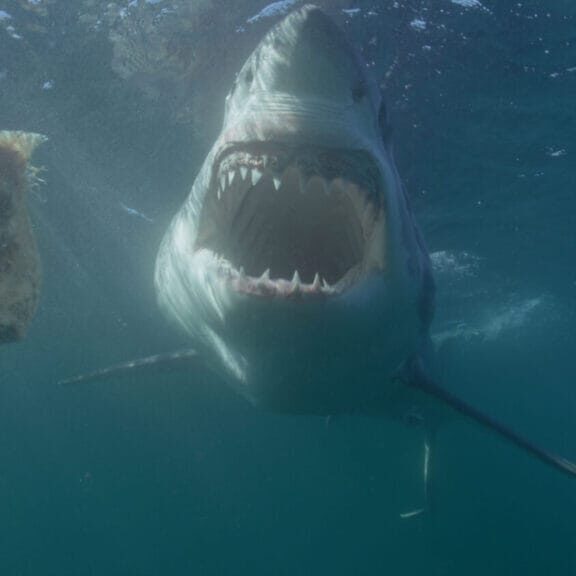
Jawsome: Canada’s Great White Sharks
Dalhousie alumni talks new CBC documentary
Jawsome: Canada’s Great White Sharks, aired on Jan. 25 on CBC’s The Nature of Things. This new documentary, which explores some of nature’s most misunderstood creatures, comes from Dalhousie University alumna Sonya Lee, who acted as director, co-writer and co-producer.
Breaking stereotypes
Lee’s documentary explores the secrets of shark sightings off the coast of Nova Scotia and Canada’s great white shark populations.
This documentary is unlike other shark shows, the director explains. She wants to make sure it doesn’t sensationalize the sharks or portray them as monstrous, human-eating machines.
“I wanted to show sharks as cautious and really smart, and almost cute and goofy and focus on that aspect of sharks instead,” says Lee.
Jawsome follows a science educator and dive instructor, a citizen scientist and a wildlife filmmaker as they uncover mysteries of Canada’s great white sharks and overcome the brutal challenges presented by the weather and the sharks themselves.
An emphasis on inclusion is one of the guiding features of the story.
“I really wanted to make sure my main characters were not scientists,” says Lee. “I wanted to show that you can do science without being a scientist. That you can still go out and be curious and find information. I want to make science accessible for everyone.”
This is Lee’s biggest project yet
The idea for this documentary first emerged when Lee was still living in Halifax. She saw more and more posts about shark sightings from beaches and boats and noticed a variety of reactions from Nova Scotians.
“The responses ranged from, ‘Wow that’s so cool!’ to ‘That’s terrifying, I’m never going near the water again,’” she laughs.
She put together a story about digging deeper into the responses she had seen from Nova Scotians. Then she pitched it to CBC and River Road Films, the leading natural history production company in Canada.
Although Lee has a lot of experience educating audiences on ocean sciences, with 400+ projects completed throughout her career as a producer, director and science communicator, this is her biggest project to date. Her previous work featured shorter-form videos for an audience of primarily grade six to nine students.
“With this project, I’m speaking to a larger adult audience on broadcast TV and in a longer format, so I’m really excited about that,” says Lee.
The broadcast will span around 45 minutes, the longest piece she’s ever done.
Dalhousie roots
As an alumnus of Dalhousie, her education prepared her well for this documentary, which she describes as a love letter to Nova Scotia. Studying marine biology made it a lot easier for her to digest the information she included in her documentary and present it in a way that makes sense to her non-science-oriented audiences.
“On top of that,” she adds, “I worked as a science communicator in Halifax, with scientists from Dal, so a lot of the connections, and the characters and the scientists—even the crew I worked with on this project—came from my experience going to school and working at Dal and living in Nova Scotia.”
Looking back to her time at Dal, the successful Dalhousie alumnus shares something she wishes she knew sooner. When studying science, a career as a scientist is not your only option.
“It was so difficult for me going through marine biology because I thought my only option was to go on to my master’s and my PhD and become a scientist. But your science degree can be applied to creative fields like what I’m doing—you don’t have to be a scientist if you’re studying science.”
Now, years after she graduated, she can take her knowledge and understanding of the sciences and use it in a creative way, bringing new audiences into the world of ocean sciences in a way that makes sense to them.
Jawsome sheds light on a subject that is very often misunderstood and works to make audiences understand just how important these shark sightings are.
“Having great white sharks in Nova Scotia is so special,” says Lee. “There are not a lot of places in the world where you can see great white sharks. And we have them in Nova Scotia of all places! These are endangered animals, and Nova Scotia is a place where they come regularly, meaning it is a healthy enough ecosystem to support sharks. I think Nova Scotians should be really proud and really excited about that.”
If you are interested in diving into the world of great white sharks, you can watch Jawsome: Canada’s Great White Sharks on CBC Gem.






